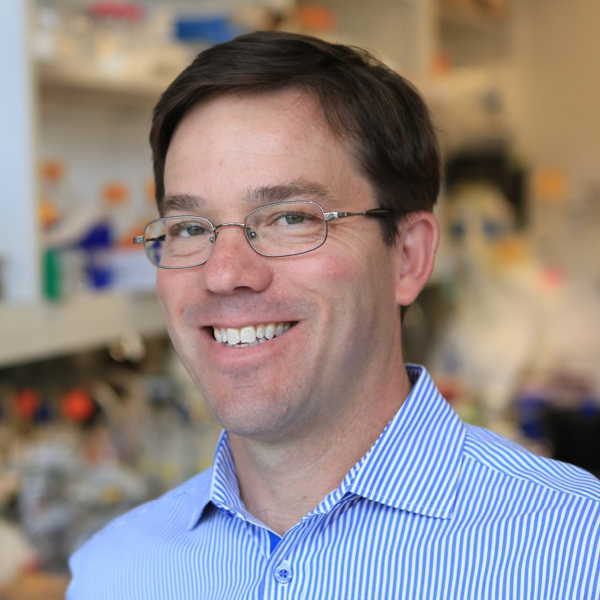Published December 6, 2019
A little over a month ago, Chris Rusconi joined PKD Foundation as its new Chief Research Officer. Over the past 30 days, Chris has been immersed in all things PKD from attending Kidney Week 2019 in Washington DC to the quarterly board meeting. As he settles into his new role, we had the chance to sit down and learn more about his vision for the future.
PKD Foundation (PKDF): Can you tell us about the role of a Chief Research Officer (CRO) and what that means to PKD Foundation?
 Chris: This is a new role for the Foundation and combines the responsibilities of a Chief Scientific Officer with some of those typically associated with a Chief Medical Officer focused on research and development. As CRO, I am here to work with the research team and community to set a strategic direction for research within the Foundation. This is a long-term approach in which we’ll create one-, three-, and five-year plans to bring the most benefits to ADPKD and ARPKD patients.
Chris: This is a new role for the Foundation and combines the responsibilities of a Chief Scientific Officer with some of those typically associated with a Chief Medical Officer focused on research and development. As CRO, I am here to work with the research team and community to set a strategic direction for research within the Foundation. This is a long-term approach in which we’ll create one-, three-, and five-year plans to bring the most benefits to ADPKD and ARPKD patients.
In this role, I will also interact with patients, regulators, and researchers to look for ways to improve the resources available to the patient and research communities. This will include overseeing the new ADPKD Patient Registry that launched in September and engaging with patients regarding how they share their data, how we can connect patients with resources, and what we can do to facilitate better outcomes for patients.
PKDF: Please tell us a little about your background.
Chris: Although I am new to kidney research, I have worked in multiple therapeutic areas, so I am confident that with the support of the PKD community I’ll get up to speed fast. I am a molecular biologist and biochemist by training. As a graduate student, I did very basic research and then pivoted to translational research during my post-doctoral training with a goal of conducting research that could help patients. For the last 16 years, I’ve worked in biotech leading drug discovery and development teams. I also have a strong entrepreneurial bent and have founded or been a founding member of several biotech companies with a focus on developing growth plans and raising funds to bring those plans to life.
PKDF: Why have you chosen to work with PKD Foundation?
Chris: I really enjoyed my time in biotech R&D and was fortunate to lead talented teams that created a number of exciting therapeutics with great potential to benefit patients. Unfortunately, despite our best efforts, we couldn’t drive any of these programs across the finish line of a marketing approval so they could actually get to patients.
One of my main motivators in joining the PKD Foundation is that I believe the Foundation offers a broader platform with more ways to facilitate improvements in patient outcomes than I could access in biotech. Within the Foundation, we can directly facilitate research and bring new researchers into the PKD field with grant programs; influence legislation, grow federal research funding, and provide a patient voice with directed advocacy; and directly collaborate with regulators and industry to drive development of new therapeutics for our patient communities and build and improve on research tools such as the Registry as part of our core internal research efforts.
This is a much greater set of platforms and tools to improve patient outcomes than I could ever access in the context of a biotech company. With my background in drug development and entrepreneurism, I think I can help us set strategic goals within the Foundation and develop and execute plans to make the most of these tools for the PKD community.
PKDF: What are your goals in the coming year?
Chris: While I’ve only been with the Foundation for a short time, I am quickly being brought up to speed on the research we are supporting and beginning to get a sense of what we may be able to do to drive PKD research forward for patients over the next several years.
During 2020, our ADPKD Registry will be a primary area of focus with the main goal being to figure out the best strategies to improve upon what the Registry offers to researchers and patients. We want to better understand what additional research questions to ask, what types of data to collect, and how the data we’re collecting can be used by patients, their families, and researchers to lead to better patient care and outcomes. The Registry is off to a great start, and we want to continue to engage patients to grow the Registry into the best possible resource it can be.
With the first drug for ADPKD approved last year, there is also an opportunity for us to work with industry and academic researchers to capitalize on this success. In drug development, a success like the approval of tolvaptan motivates other companies to come into PKD as a therapeutic focus area. We will evaluate what the Foundation and our collaborators can do to facilitate further development of new therapies for both the ADPKD and ARPKD patient populations. These efforts could take a variety of forms, including supporting the development of new biomarkers and clinical endpoints endorsed by regulators, to direct support for therapeutic and outcomes research, to directed advocacy to support research goals and patient needs. These aren’t six- to 12-month goals; they are strategies for the longer term that I’ll work on elaborating in the upcoming year.
PKDF: Is there anything else you’d like to share with the PKD community?
Chris: My family and I are very excited to be joining the PKD Foundation. My wife and I both grew up in Kansas City, and it’s great to be able to do important work and be home with our extended family. I’m very interested in understanding the patient’s experience, so if you see me at a Walk or we meet in person at some point, I hope you’ll be comfortable in approaching me. I want to be a resource for those impacted by PKD.









0 Comments